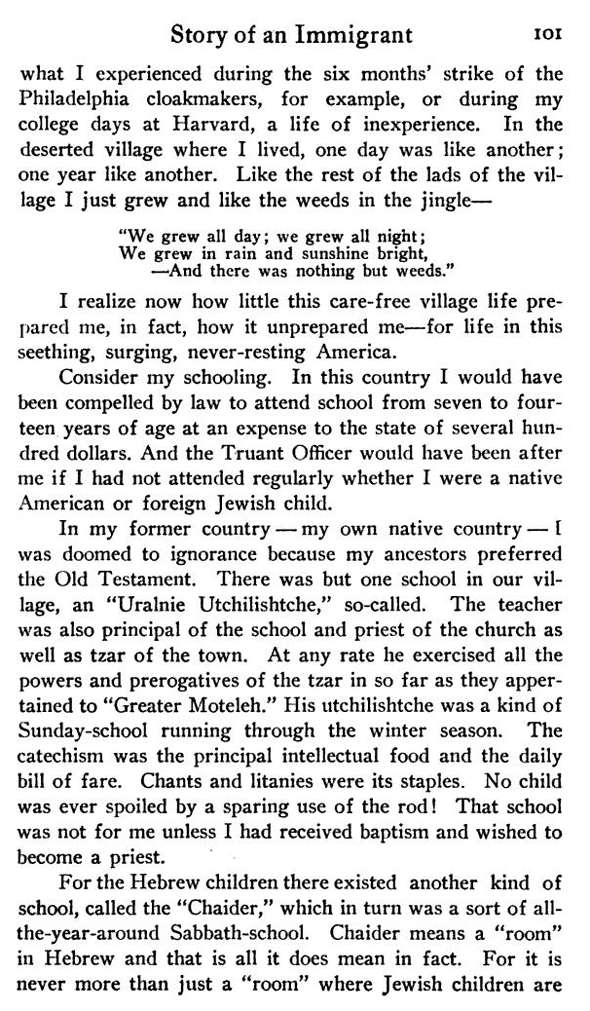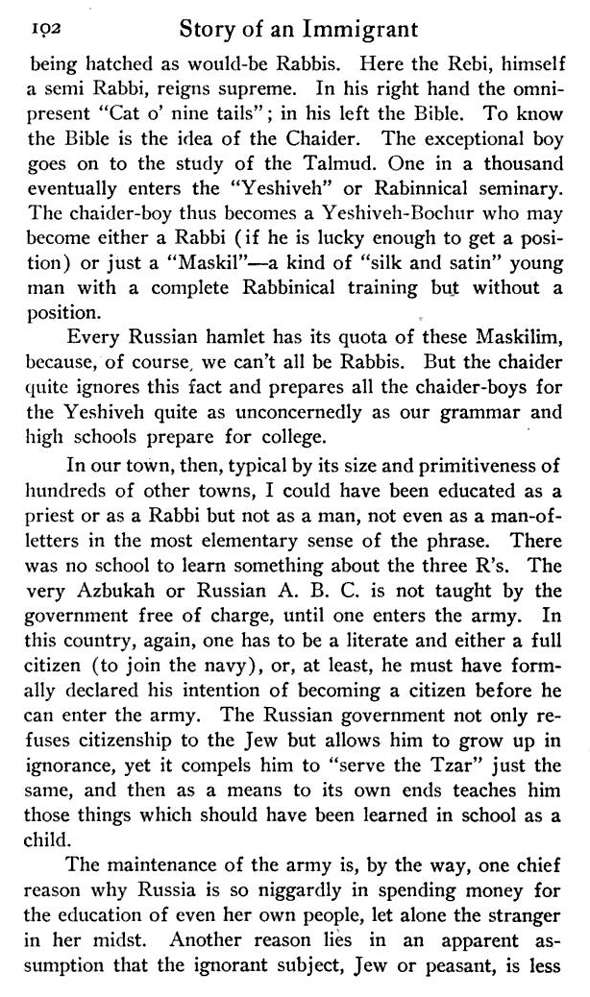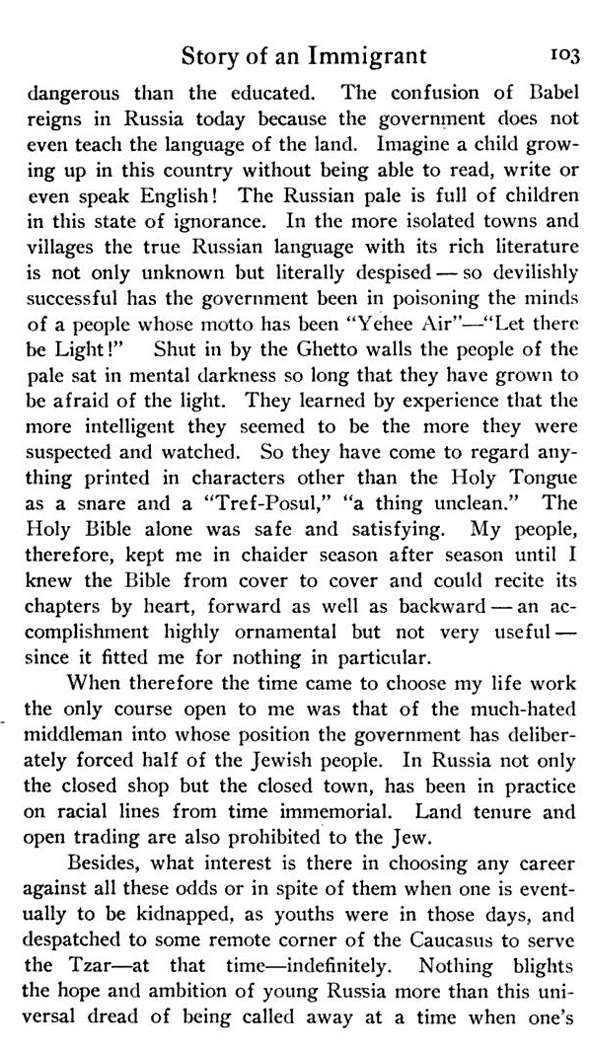In one of these books he records the following ostensibly true anecdote, meant to illustrate the "shallow Americanism" and "surface patriotism" which was being "universally" inculcated at the time, and which he was afraid could easily be grown into bigotry:
An Irish boy observed to one of our residents that on Easter Day he intended to kill his little Jewish classmate. Having long experience of the vigorous language and kind heart of the young Celt, she paid little attention to the threat, but was more startled when the soft-eyed Francesco chimed in that he was also going to destroy him "because he killed my Gawd." "But," said the teacher, "Christ was a Jew." "Yes, I know," answered the young defender of the faith, "He was then, but He's an American now."You wouldn't know it from his name, but Philip Davis of Harvard and Boston U was born in Motol (a little town which also produced Chaim Weizmann and Saul Lieberman), or "Moteleh" as he calls it (and as it was known by the Jews).
His description of the much-derided cheder is that the Rebi (as he writes it), who is a "semi Rabbi," holds a whip in one hand and a Chumash in the other. He writes that "the exceptional boy goes on to the study of Talmud. One in a thousand eventually enters the "Yeshiveh." Even with allowance for exaggeration he does seem to be reflecting the actual situation in Eastern Europe with regard to how common Yeshiva was. Once in a yeshiva, Davis writes, the chaider-boy, now Yeshiveh-Bochur, eventually becomes one of two things, a rabbi, or a maskil. Since "of course, we can't all be rabbis" every shtetl has its quota of maskilim, whom he calls "silk and satin young [men]." I can't quite figure out that idiom, but I think that silk and satin refer to dress, not manners, therefore I think he means that they dress in a modern, somewhat pretentious and foppish way.[1] (In another place I saw contemporary Russian Maskilim defined in the following way: their "stock in trade is a vast knowledge of the Talmud and "More Nebuchim," and a smattering of European languages.")
Then follows Davis' censure of the Russian attitude toward public education (as he puts it, they don't bother making sure a person learns the "Azbukah" (A, B, C s) until and unless he is in the army), evidently under the belief that the ignorant subjects are less dangerous to the regime than the educated ones. Although Davis reserves the bulk of his criticism for the Russian government's attitude toward education, of course he doesn't think much of the Jewish attitude where none of the basics were taught in cheder, and where a vast populace not only couldn't read or write the local language, but they also couldn't speak it.
Finally, he makes the interesting comment that ultimate blame for the attitude that anything not printed in Hebrew is "Tref-Posul" is the government who have discriminated against and oppressed the people to the extent that not only is the great Russian language and its literature unknown, but literally despised. He opines that being shut into ghettos, and therefore darkness for so long, the people have become afraid of light - a people "whose motto has been "Yehee Air" - "Let there be Light!"
What's pretty cool about that is that "Yehee Air" apparently is reflective of his native Litvish pronunciation of Hebrew, where the vowel חולם becomes צירי. "Air" instead of "Or" (or "Oir").



[1] Update a reader pointed out to me that Davis was surely translating directly from the Yiddish idiom זיידענער יונגער מאן, today in Hebrew an אברך משי, so there you go.

"startled when the soft-eyed Francesco chimed in that he was also going to destroy him "because he killed by Gawd."
ReplyDelete'my' Gawd, I suppose?
-Phil
Thanks Phil. :)
ReplyDeleteChaim Weitzman's autobiography "Trial and Error" also has a description of the cheder in Motel. It might be an idea to compare.
ReplyDeleteNSY
There is a fine, quirky old shul in Chicago called Anshe Motele. It amazes me that a shtetl with 1300 Jews (as per your Motol link) made such a mark in Jewish history and communal life.
ReplyDeleteCan you interpret the footnote for those of us not familiar with the Yiddish or Hebrew idiom (as it is, for me, you've just translated the English phrase into Hebrew and Yiddish without elucidating it.)
ReplyDeleteTzere for Cholam was a pretty common substitution, not just in Lita, but in Galicia also.
ReplyDeleteJXG.Sorry but Galitzianer do not say Teyre they say Toyroh.In Lita one says Teyre Er for Torah Or that is not the way Galitzianer say it unless there is a galizianer communoty comprised of emigrants from Shavel.
ReplyDeleteThe only other place I have found that comes close is some Jews in Yemen.
Unfortunately almost everyone with these authentic pronunciations are gone. There is nothing like hearing an actual Litvak say "Ya-an-KAYV" (Ya'akov) or "May-SEH" (Moshe) but rest assured that is actually how they said it. Many people who did know actual Litvaks through yeshivos and the like may not have realized that some of them were adulterating their pronunciation to conform a little bit more with America. The best way to hear it was from an unaffiliated Litvak (ie, not a rav of a shul or in a yeshiva). I used to have the pleasure of hearing a very, very old, very unembarrassed Litvak lein.
ReplyDelete